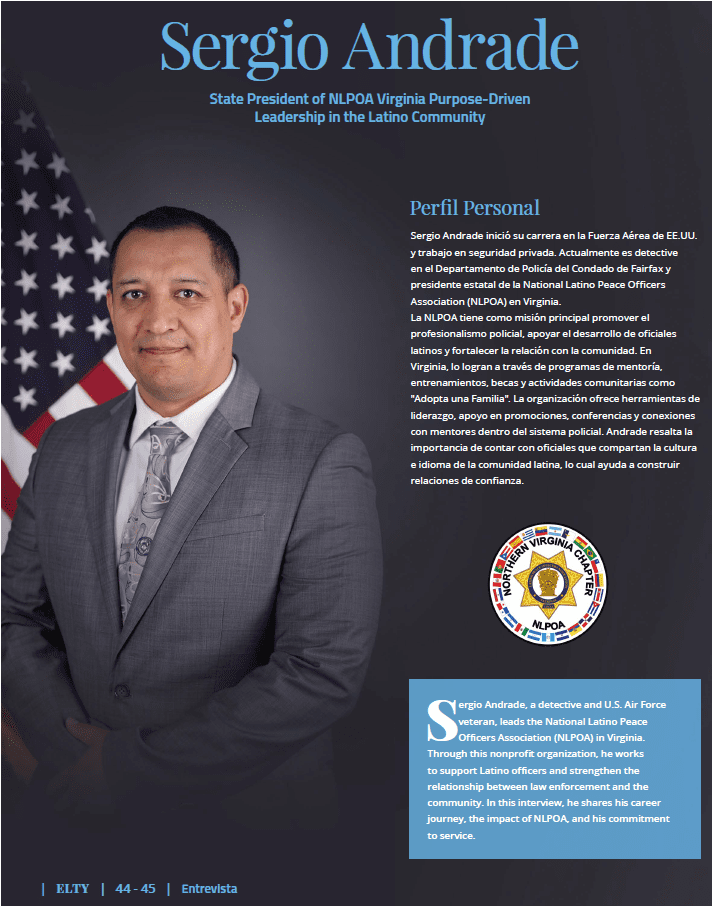Sergio Andrade
State President of NIPOA Virginia Purpose-Driven Leadership in the Latino Community

How did your journey in law enforcement begin, and what motivated you to become part of NLPOA?
My professional career in law enforcement began after several years working in private security and later serving 10 years in the United States Air Force. I then joined the Fairfax County Police Department, where I have been serving for 20 years, currently as a detective in the Major Crimes Bureau.
For a long time, I dreamed of bringing an organization to Virginia that would create
spaces for our Latino officers— spaces where they could feel represented and supported.
That dream is now a reality. I worked very hard to make it happen, and I’m proud to have
established the first NLPOA chapter in the state and to serve as its state president. NLPOA
is a national organization with over 15,000 members.
Joining this association was driven by my desire to provide mentorship, representation, and growth
tools to our officers, while also giving back to our community through leadership and service.
What is the main mission of the National Latino Peace Officers Association, and how is it implemented in Virginia? The primary mission of NLPOA is to promote professionalism in policing,
support the development of Latino officers, and strengthen the relationship between law enforcement and the community.
In Virginia, we carry out this mission through mentorship programs, professional development events, andcommunity activities aimed at building trust and cooperation between officers and citizens.
How does the organization support Latino officers in their professional and personal growth?
NLPOA provides mentorship opportunities, support networks, specialized training, and leadership development. Our organization connects Latino officers with professionals who can guide their careers, help them prepare for promotions, and support their growth in both personal and
professional skills.
What kind of community programs or activities does NLPOA carry out in Northern Virginia?
One of our most important programs is “Adopt a Family,” which supports families
in need each month with food and essential supplies. We’re also launching a scholarship program for Latino youth who want to continue their education.
In addition, we actively participate in community events and collaborate with local organizations to provide resources and promote a positive police presence.
How does NLPOA help strengthen the relationship between the police and the Latino community?
We act as a bridge of understanding between the police and the Latino community, promoting mutual respect and dialogue. By having officers who share the community’s
language, culture, and experiences, we’re able to build relationships based on trust.
We organize events where the community can interact with officers in a positive, educational, and accessible environment.
What tools or training does NLPOA offer to help Latino officers advance in their careers?
We offer preparation for promotional interviews, supervision training, and access to national conferences focused on professional development. We also connect our members with mentors who have
reached leadership positions in law enforcement and who can offer practical guidance.
What advice would you give to a young Latino who dreams of becoming a police officer? Never doubt your value or your ability to serve. Our culture and roots are a strength. Study hard, stay focused, and surround yourself with people who encourage your growth. Seek out organizations like NLPOA that support your journey. Law enforcement needs diverse and committed voices—like those of our Latino youth.
Lastly, what message would you like to share with the Latino community about the work you’re doing?
I want you to know that we are here to serve, support, and represent you with pride. Our work is not just about protection—it’s about building bridges, creating opportunities, and being role models for future generations. NLPOA is deeply committed to our community, and we work every day to make sure our voices are heard, our families feel safe, and that we all have a dignified place within the system
we serve.


